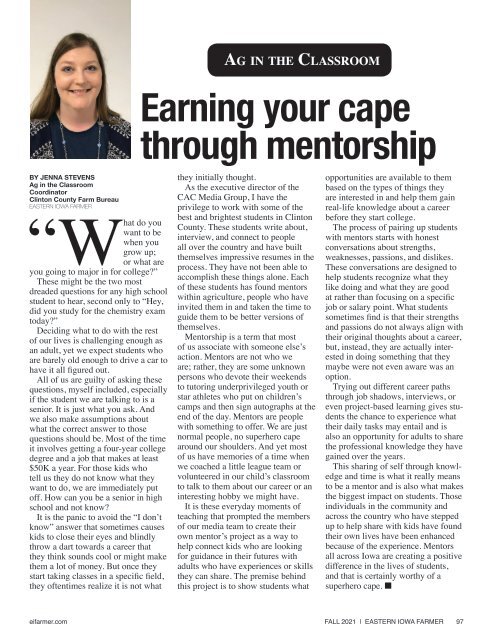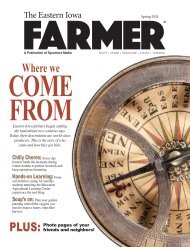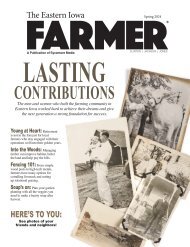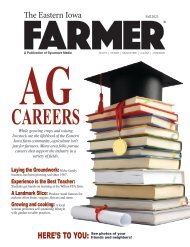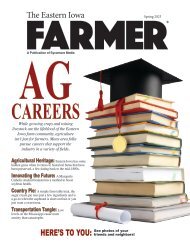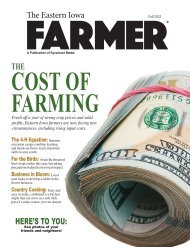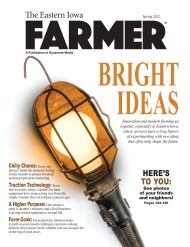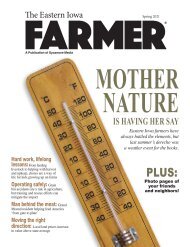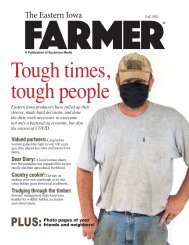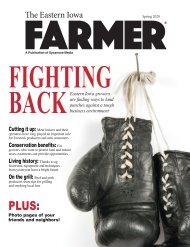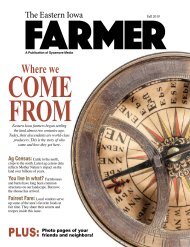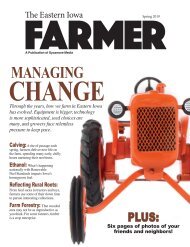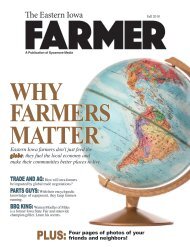You also want an ePaper? Increase the reach of your titles
YUMPU automatically turns print PDFs into web optimized ePapers that Google loves.
Earning your cape<br />
through mentorship<br />
By JENNA STEVENS<br />
Ag in the Classroom<br />
Coordinator<br />
Clinton County Farm Bureau<br />
EASTERN IOWA FARMER<br />
do you<br />
want to be<br />
when you<br />
grow up;<br />
“What<br />
or what are<br />
you going to major in for college?”<br />
These might be the two most<br />
dreaded questions for any high school<br />
student to hear, second only to “Hey,<br />
did you study for the chemistry exam<br />
today?”<br />
Deciding what to do with the rest<br />
of our lives is challenging enough as<br />
an adult, yet we expect students who<br />
are barely old enough to drive a car to<br />
have it all figured out.<br />
All of us are guilty of asking these<br />
questions, myself included, especially<br />
if the student we are talking to is a<br />
senior. It is just what you ask. And<br />
we also make assumptions about<br />
what the correct answer to those<br />
questions should be. Most of the time<br />
it involves getting a four-year college<br />
degree and a job that makes at least<br />
$50K a year. For those kids who<br />
tell us they do not know what they<br />
want to do, we are immediately put<br />
off. How can you be a senior in high<br />
school and not know?<br />
It is the panic to avoid the “I don’t<br />
know” answer that sometimes causes<br />
kids to close their eyes and blindly<br />
throw a dart towards a career that<br />
they think sounds cool or might make<br />
them a lot of money. But once they<br />
start taking classes in a specific field,<br />
they oftentimes realize it is not what<br />
they initially thought.<br />
As the executive director of the<br />
CAC Media Group, I have the<br />
privilege to work with some of the<br />
best and brightest students in Clinton<br />
County. These students write about,<br />
interview, and connect to people<br />
all over the country and have built<br />
themselves impressive resumes in the<br />
process. They have not been able to<br />
accomplish these things alone. Each<br />
of these students has found mentors<br />
within agriculture, people who have<br />
invited them in and taken the time to<br />
guide them to be better versions of<br />
themselves.<br />
Mentorship is a term that most<br />
of us associate with someone else’s<br />
action. Mentors are not who we<br />
are; rather, they are some unknown<br />
persons who devote their weekends<br />
to tutoring underprivileged youth or<br />
star athletes who put on children’s<br />
camps and then sign autographs at the<br />
end of the day. Mentors are people<br />
with something to offer. We are just<br />
normal people, no superhero cape<br />
around our shoulders. And yet most<br />
of us have memories of a time when<br />
we coached a little league team or<br />
volunteered in our child’s classroom<br />
to talk to them about our career or an<br />
interesting hobby we might have.<br />
It is these everyday moments of<br />
teaching that prompted the members<br />
of our media team to create their<br />
own mentor’s project as a way to<br />
help connect kids who are looking<br />
for guidance in their futures with<br />
adults who have experiences or skills<br />
they can share. The premise behind<br />
this project is to show students what<br />
opportunities are available to them<br />
based on the types of things they<br />
are interested in and help them gain<br />
real-life knowledge about a career<br />
before they start college.<br />
The process of pairing up students<br />
with mentors starts with honest<br />
conversations about strengths,<br />
weaknesses, passions, and dislikes.<br />
These conversations are designed to<br />
help students recognize what they<br />
like doing and what they are good<br />
at rather than focusing on a specific<br />
job or salary point. What students<br />
sometimes find is that their strengths<br />
and passions do not always align with<br />
their original thoughts about a career,<br />
but, instead, they are actually interested<br />
in doing something that they<br />
maybe were not even aware was an<br />
option.<br />
Trying out different career paths<br />
through job shadows, interviews, or<br />
even project-based learning gives students<br />
the chance to experience what<br />
their daily tasks may entail and is<br />
also an opportunity for adults to share<br />
the professional knowledge they have<br />
gained over the years.<br />
This sharing of self through knowledge<br />
and time is what it really means<br />
to be a mentor and is also what makes<br />
the biggest impact on students. Those<br />
individuals in the community and<br />
across the country who have stepped<br />
up to help share with kids have found<br />
their own lives have been enhanced<br />
because of the experience. Mentors<br />
all across <strong>Iowa</strong> are creating a positive<br />
difference in the lives of students,<br />
and that is certainly worthy of a<br />
superhero cape. n<br />
eifarmer.com <strong>Fall</strong> <strong>2021</strong> | <strong>Eastern</strong> <strong>Iowa</strong> <strong>Farmer</strong> 97<br />
<strong>Eastern</strong><strong>Iowa</strong><strong>Farmer</strong>_<strong>Fall</strong><strong>2021</strong>.indd 97<br />
9/15/21 10:25 am


